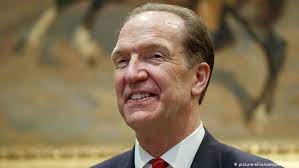Apparently miffed by the worsening impact of the COVI9-19 pandemic on the global community, particularly its crippling effects on businesses and social welfare of billions pf people, the World Bank on Thursday promised to commit more efforts and resources to frontally control its further spread in the months ahead.
Giving the assurance during the world press conference on the ongoing virtual meetings of the International Monetary Fund (IMF)-World Bank Group, the President of the World Bank, David Malpass, noted that currently the pandemic was affecting broad range of development issues which require more attention and collective collaboration to deal with.
The banker said that a combination of factors has triggered uneven recovery in global economies just as inequality is worsening across country groups and per capita income in advanced economies is growing nearly 5% in 2021 compared to only 0.5% in low-income countries.
According to him, the world economy’s outlook remains grim for most of the developing world, with high inflation, too few jobs, shortages that extend to food, water, and electricity characterizing their economic space
For example, Malpass pointed out that due to the pandemic, the factory and port shutdowns were accentuating and bottlenecks in logistics and supply chains worsening now, adding that the World Bank Group estimates that 8.5% of global container shipping is stalled in or around ports.
He further explained that the disruptions were placing sharp price increases on shipping fees, and the final costs of goods and projected that it would take time and cooperation of policymakers across the world to address the supply chain disruptions.
On the COVID-19 pandemic worsening spread, the World Bank President said the pandemic was pushing up the poverty around the world, with nearly 100 million people pushed into extreme poverty so far.
Noting that the world is witnessing a tragic reversal in development as the progress in reducing extreme poverty suffering setback by years for some, by a decade, Malpass pointed out that it had become vital that the global community jointly address this head-on by redirecting policies in both the advanced economies and developing countries so that growth and investment are more widespread.
Speaking on the World Bank Group and other international organisations’ plan on the pandemic, the World Bank President said: “Our highest priority is to secure access to vaccines and speed up shots in arms. I chair the Multilateral Leaders Taskforce, which includes Kristalina [Georgieva, IMF Managing Director], Tedros [Adhanom Ghebreyesus, WHO Director-General], and Ngozi [Okonjo-Iweala, WTO Director General].
“We had a good public discussion yesterday and we’ll soon be holding our fifth meeting of the Taskforce focused on matching the extensive pledges and trying to help actual vaccinations come out of the pledges that have been given by the advanced economies. There’s got to be a way to close that deployment gap.
“The World Bank is able to finance the doses and the deployment, but there needs to be early deliveries scheduled, so we are urging governments that have sufficient doses to swap early deliveries to allow for vaccinations in developing countries and we are urging the finance ministers and health ministers of developing countries to enter contracts in order to get deliveries early, as soon as possible of vaccines.
“And we’re working with countries also to reduce the hesitancy to encourage the vaccination of people. Our observation through the Task force, and through our country programs, is that when the countries are able to get vaccines, people are being vaccinated and the vaccination rate is going up consistently, when the supply is available.
“The World Bank’s support for the poorest countries is at an all-time high. We’re working to help countries secure more doses and deploy them”, Malpass assured.
He disclosed that apart from past support, 250 million doses were under contract by the World Bank that can get to countries through country financing programmes.






